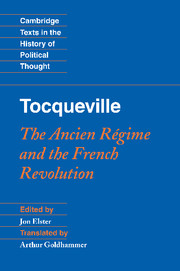Book contents
- Frontmatter
- Contents
- Introduction
- Bibliographical Note
- Chronology
- TOCQUEVILLE: THE ANCIEN RÉGIME AND THE FRENCH REVOLUTION
- Foreword
- Book I
- Book II
- Book III
- III.1 How, Toward the Middle of the Eighteenth Century, Men of Letters Became the Country's Leading Politicians, and the Effects That Followed from This
- III.2 How Irreligion Was Able to Become a General and Dominant Passion in Eighteenth-Century France, and How It Influenced the Character of the Revolution
- III.3 How the French Wanted Reforms Before They Wanted Liberties
- III.4 That the Reign of Louis XVI Was the Most Prosperous Era of the Old Monarchy, and How That Very Prosperity Hastened the Revolution
- III.5 How Attempts to Relieve the People Stirred Them to Revolt
- III.6 On Some Practices That Helped the Government Complete the People's Revolutionary Education
- III.7 How a Great Administrative Revolution Preceded the Political Revolution, and on the Consequences It Had
- III.8 How the Revolution Emerged Naturally from the Foregoing
- Appendix: On the Pays d'états, and in Particular Languedoc
- Notes
- Index
- CAMBRIDGE TEXTS IN THE HISTORY OF POLITICAL THOUGHT
III.3 - How the French Wanted Reforms Before They Wanted Liberties
Published online by Cambridge University Press: 05 June 2012
- Frontmatter
- Contents
- Introduction
- Bibliographical Note
- Chronology
- TOCQUEVILLE: THE ANCIEN RÉGIME AND THE FRENCH REVOLUTION
- Foreword
- Book I
- Book II
- Book III
- III.1 How, Toward the Middle of the Eighteenth Century, Men of Letters Became the Country's Leading Politicians, and the Effects That Followed from This
- III.2 How Irreligion Was Able to Become a General and Dominant Passion in Eighteenth-Century France, and How It Influenced the Character of the Revolution
- III.3 How the French Wanted Reforms Before They Wanted Liberties
- III.4 That the Reign of Louis XVI Was the Most Prosperous Era of the Old Monarchy, and How That Very Prosperity Hastened the Revolution
- III.5 How Attempts to Relieve the People Stirred Them to Revolt
- III.6 On Some Practices That Helped the Government Complete the People's Revolutionary Education
- III.7 How a Great Administrative Revolution Preceded the Political Revolution, and on the Consequences It Had
- III.8 How the Revolution Emerged Naturally from the Foregoing
- Appendix: On the Pays d'états, and in Particular Languedoc
- Notes
- Index
- CAMBRIDGE TEXTS IN THE HISTORY OF POLITICAL THOUGHT
Summary
One thing worth noting is that of all the ideas and sentiments that paved the way for the Revolution, the idea of, and the taste for, political liberty in the strict sense were the last to appear and the first to vanish.
The old edifice of government had been shaky for some time. It was already tottering, and the question of political liberty had yet to arise. Voltaire scarcely thought about it: three years in England had shown him what freedom looked like but had not brought him to love it. The skeptical philosophy that was freely preached in England delighted him. English political laws left him unmoved; he noticed the flaws more than the virtues. In his letters on England, which are among his masterpieces, he has less to say about Parliament than about anything else. In reality, he envied the English mainly for their literary freedom but cared little for their political freedom, as if the former could ever exist for long without the latter.
Toward the middle of the century, writers who focused especially on questions of public administration began to appear, and since they shared certain similar principles in common, they were referred to collectively as “Economists” or “Physiocrats.” The Economists have left less of a mark on history than the philosophers. They may not have contributed as much to the advent of the Revolution. Yet I believe that the true nature of the event is best studied in their works.
- Type
- Chapter
- Information
- Tocqueville: The Ancien Régime and the French Revolution , pp. 143 - 151Publisher: Cambridge University PressPrint publication year: 2011

